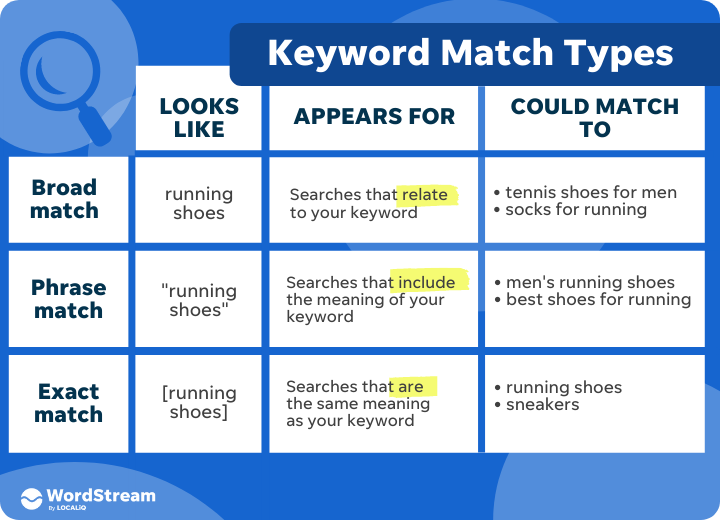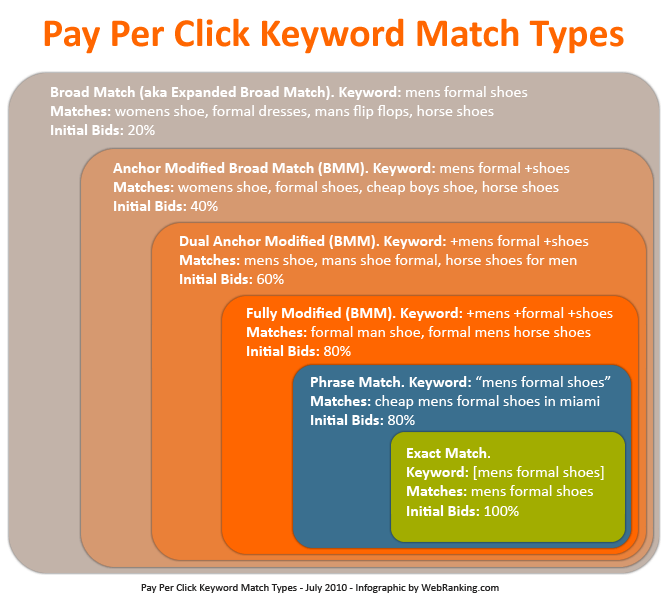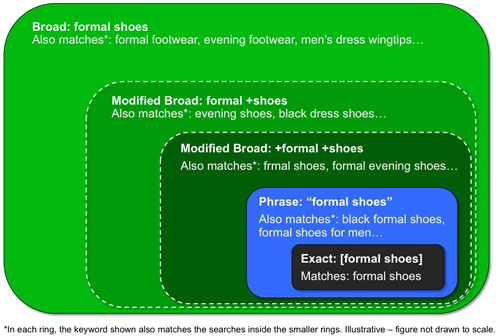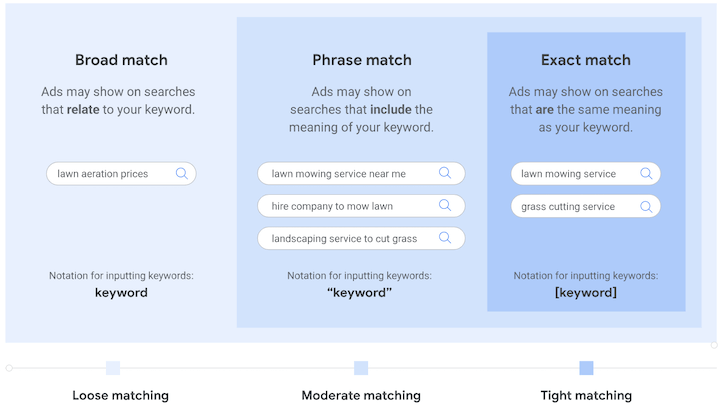Unlock the secrets of keyword match types: Broad, Phrase, and Exact – the key to maximizing your SEO strategy.

Image courtesy of via DALL-E 3
Table of Contents
Introduction to Keyword Match Types
When you search for something on the internet, have you ever noticed that certain ads pop up? Well, that’s no coincidence! Search engines like Google use a clever system to match ads to what people are looking for. And the secret ingredient in this process is keywords. Keywords are like magic words that help connect the right ads to the right searches. But did you know that not all keywords work the same way? That’s right! There are different types of keyword matches: Broad, Phrase, and Exact. Let’s dive into the world of keyword match types and uncover how they work!
Importance of Keywords
Keywords play a crucial role in the world of online searches and advertising. They are the key to unlocking the right information and connecting people with what they need. Imagine you’re searching for a new video game. By using the right keywords, you can see ads for the latest game releases, discounts, and more! Choosing the perfect keywords can help search engines show the most relevant ads to the right audience. It’s like a secret code that helps match ads to what people are searching for.
Broad Match Keywords
When it comes to understanding how keywords work in online searches and advertisements, one important concept to grasp is the idea of broad match keywords. Broad match keywords are the most flexible type of keyword match and can help show ads for variations of the keyword you choose. Let’s take a closer look at how broad match keywords function and their pros and cons.
How Broad Match Works
Search engines use broad match to figure out similar searches that may not exactly match the keyword you select. For example, if your keyword is “kids’ toys,” your ad might show up when someone searches for “children’s playthings” or “toy stores for kids.” Broad match allows for some flexibility in how your ad is triggered, reaching a wider audience that may be interested in what you offer.
Pros and Cons of Broad Match
Using broad match keywords can be beneficial because they help cast a wide net and reach a larger group of potential customers. It can also be a time-saver, as you don’t need to come up with every possible variation of a keyword. However, a downside to broad match is that it may sometimes show ads to people who are not your target audience, leading to wasted clicks and a lower return on investment. It’s essential to monitor and adjust your broad match keywords regularly to ensure they are reaching the right audience.
Phrase Match Keywords
When it comes to using keywords for online searches and ads, there are different match types that help target the right audience. One such match type is phrase match keywords, which ensure ads are shown when the searcher’s words match the keyword in a specific order within quotations.

Image courtesy of www.wordstream.com via Google Images
Understanding Phrase Match
Phrase match keywords are specific in the sense that the words must appear in the exact order specified. For example, if the phrase match keyword is “best pizza in town,” the ad will only be shown when someone searches for that exact phrase in that precise order. This can help businesses target a more specific audience looking for a particular product or service.
Benefits and Drawbacks
One of the advantages of using phrase match keywords is the precision it offers. By specifying the order of words, businesses can reach a more targeted audience likely to convert. However, a drawback of phrase match is that it may miss out on potential variations or related searches. If the exact phrase specified is not commonly used, the ad may not appear as frequently as desired.
Exact Match Keywords
Exact match keywords are the most precise type of keyword match used in online advertising. When a search term matches an exact keyword, the ad will only show up for that exact term. These keywords are usually written within brackets to indicate the exactness of the match.
How Exact Match Functions
Let’s say you have an exact match keyword “red shoes.” Your ad will only show up when someone types in “red shoes” exactly as it is, without any additional words or variations. This ensures that your ad is displayed to people who are specifically looking for what you offer.
Advantages and Disadvantages
The main advantage of using exact match keywords is the high level of precision. Your ad is displayed only to people who are searching for the exact term, increasing the chances of attracting relevant traffic to your website.
However, one drawback of exact match keywords is that they may miss out on potential variations and related searches that could also be valuable. It’s essential to weigh the pros and cons when deciding whether to use exact match keywords for your advertising campaigns.
Choosing the Right Match Type
When it comes to selecting the best keyword match type for your online advertisements, it’s essential to consider your goals and objectives. Each match type—broad, phrase, and exact—has its own unique advantages and drawbacks. By understanding your advertising goals, you can determine which match type is most suitable for your campaign.

Image courtesy of www.webranking.com via Google Images
Understanding Your Goals
Before deciding on a match type, think about what you want to achieve with your ads. Are you aiming to reach a broad audience and increase brand visibility? In that case, broad match keywords may be the way to go. On the other hand, if you have specific products or services you want to promote to a targeted audience, exact match keywords could be more effective.
Combining Match Types
In some situations, using a combination of broad, phrase, and exact match keywords can help you cover more ground and reach different segments of your target market. By diversifying your keyword strategy, you can maximize your ad exposure while ensuring that your ads are shown to the right audience.
Real-Life Examples
Let’s imagine a local toy store that wants to attract more customers to its online website. The store owner decides to use different keyword match types to reach a wider audience looking for various types of toys. For broad match keywords, they might use words like “fun toys” or “kids’ games” to capture a wide range of searches related to toys. This way, whenever someone searches for anything related to toys, their ad has a chance to show up.
On the other hand, for phrase match keywords, the toy store might choose phrases like “educational toys for kids” or “toy store near me” to target more specific searches. These phrases ensure that the ad appears when someone searches for those exact words in that order, providing a more targeted approach.
Lastly, for exact match keywords, the toy store could use specific terms such as “LEGO sets” or “barbie dolls” to show ads only when someone searches for those exact phrases. This precision helps in reaching potential customers who are specifically looking for those products.
Example 2: A Pet Shop
Now, let’s consider a pet shop that sells a variety of products for pets like food, toys, and accessories. To attract customers searching for specific pet items, the pet shop owner utilizes different keyword match types strategically.
Using broad match keywords like “pet supplies” or “cat toys,” the pet shop can cast a wide net and capture anyone searching for general pet-related products. This flexibility allows the store to reach a large audience interested in various pet items.
For phrase match keywords, the pet shop may opt for phrases like “dog food delivery” or “pet grooming services” to target customers looking for specific pet services. By using phrase match, the shop ensures that its ads are shown when search queries closely match the chosen phrases.
Lastly, by utilizing exact match keywords like “hamster cages” or “bird seed,” the pet shop can precisely target customers searching for those exact products. This approach helps in showcasing relevant ads to potential buyers who are specifically looking for those items.
Tips for Optimizing Keyword Matches
When it comes to optimizing keyword matches for your online advertising, there are a few key strategies that can help you make the most of each match type. By following these best practices, you can ensure that your ads are reaching the right audience and maximizing your ROI.

Image courtesy of www.webranking.com via Google Images
Regularly Check Performance
One of the most important things you can do to optimize your keyword matches is to regularly check how well your keywords are performing. By monitoring the performance of your keywords, you can see which ones are driving the most traffic and conversions, and make adjustments as needed.
Use Negative Keywords
In addition to monitoring the performance of your keywords, it’s also important to use negative keywords in your advertising campaigns. Negative keywords help you avoid showing your ads for irrelevant searches, which can save you money and improve the overall effectiveness of your campaigns.
Common Mistakes to Avoid
One common mistake when using keyword match types is relying too heavily on broad match keywords. While broad match is flexible and can capture a wide range of search queries, it might also show your ads to a broader audience than you intended. This can lead to wasted ad spend on irrelevant clicks from users who are not genuinely interested in your products or services.
Ignoring Negative Keywords
Another pitfall to avoid is overlooking the importance of negative keywords. Negative keywords are terms that you specify to prevent your ads from showing up in irrelevant searches. If you fail to use negative keywords effectively, your ads may appear in searches that are not aligned with your target audience, resulting in a lower click-through rate and wasted advertising budget.
Conclusion
In this blog post, we delved into the world of keyword match types: Broad, Phrase, and Exact. Understanding how these match types work is crucial for optimizing your online advertisements and reaching the right audience effectively.

Image courtesy of www.wordstream.com via Google Images
Recap of Keyword Match Types
In summary, Broad match keywords are flexible and can show ads for various keyword variations, while Phrase match keywords require the search terms to be in a specific order for the ad to appear. Exact match keywords are the most precise, only triggering ads when the search term exactly matches the keyword.
Final Thoughts
As you embark on your journey of utilizing keyword match types, remember to consider your goals and choose the best match type accordingly. By combining the different match types strategically and regularly monitoring your keyword performance, you can enhance the effectiveness of your advertising campaigns. Take the knowledge you’ve gained here and apply it to improve your keyword strategies for better results.
Want to turn these SEO insights into real results? Seorocket is an all-in-one AI SEO solution that uses the power of AI to analyze your competition and craft high-ranking content.
Seorocket offers a suite of powerful tools, including a Keyword Researcher to find the most profitable keywords, an AI Writer to generate unique and Google-friendly content, and an Automatic Publisher to schedule and publish your content directly to your website. Plus, you’ll get real-time performance tracking so you can see exactly what’s working and make adjustments as needed.
Stop just reading about SEO – take action with Seorocket and skyrocket your search rankings today. Sign up for a free trial and see the difference Seorocket can make for your website!
Frequently Asked Questions (FAQs)
What is the best type of keyword match?
The best type of keyword match depends on your specific goals and needs. If you want to reach a broader audience and don’t mind some variations, broad match could be suitable. If you prefer more precision and want your ads to show for specific search phrases in a certain order, then phrase match might be the way to go. And if you want maximum precision and only want your ads to display for exact search terms, then exact match is the best choice.
How often should I check my keywords?
It’s essential to regularly check and adjust your keywords to ensure optimal performance. Depending on how active your campaigns are, checking your keywords weekly or bi-weekly is a good practice. By monitoring your keywords and making necessary tweaks, you can improve the efficiency and effectiveness of your ad campaigns.
What are negative keywords?
Negative keywords are terms or phrases that you specify to prevent your ads from showing up in searches that are not relevant to your business. By using negative keywords, you can avoid wasting ad spend on irrelevant clicks and focus on reaching the right audience. For example, if you sell only new products, you might use “used” or “second-hand” as negative keywords to filter out unwanted traffic.







